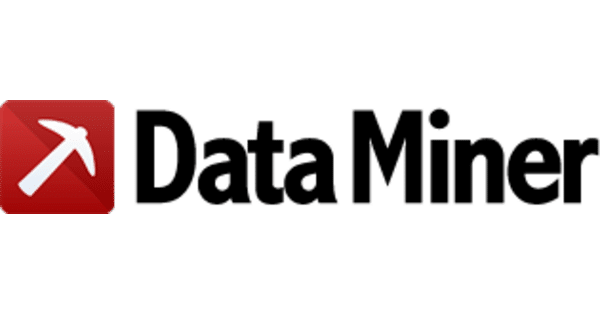What is Data Miner?
Data Miner is a comprehensive and advanced web scraping tool that allows users to extract large volumes of data from websites without manual coding. Aimed at both novices and professionals, it is often deployed for scraping text, images, links, and even JavaScript-rendered content from web pages. By automating the data collection process, Data Miner streamlines data analysis and business intelligence activities, saving time and resources.
Key Features of Data Miner:
- Point-and-Click Interface: Simplifies the scraping setup.
- Pre-Built Data Recipes: Over 50,000 public recipes for commonly scraped websites.
- Cloud-Based Operations: Allows data extraction at scale.
- API Integration: Ensures seamless flow of scraped data to databases or analytics tools.
What is Data Miner Used for and How Does it Work?
Data Miner is predominantly used for gathering structured and semi-structured data for various purposes:
- Market Research: Collecting product pricing, reviews, and inventory details.
- Competitive Analysis: Scraping data from competitor websites for benchmarking.
- SEO and Digital Marketing: Extracting keyword rankings, backlink information, and social metrics.
- News and Content Aggregation: Compiling articles, posts, or other types of public information.
How Does it Work?
- URL Selection: The user chooses the website URL to scrape.
- Data Point Identification: User identifies the data elements to collect.
- Recipe Creation: Data Miner utilizes pre-built or custom recipes to extract the data.
- Data Extraction: The tool initiates the scraping process.
- Data Export: The collected data is exported in various formats like CSV, Excel, or JSON for further analysis.
| Step | Action | Output |
|---|---|---|
| 1 | URL Selection | Target Website |
| 2 | Identification | Data Points |
| 3 | Recipe Creation | Scraping Instructions |
| 4 | Data Extraction | Raw Data |
| 5 | Data Export | Structured Data in CSV/JSON |
Why Do You Need a Proxy for Data Miner?
Utilizing a proxy server while operating Data Miner offers several strategic advantages:
- Anonymity: Web scraping can sometimes be against a website’s terms of service. A proxy helps mask your IP address, providing an added layer of security.
- Rate Limit Bypass: Many websites have limitations on the number of requests from a single IP address. Proxies enable you to make multiple simultaneous requests.
- Geolocation Testing: Proxies can simulate access from different geographical locations.
- Load Balancing: Distributes requests across multiple servers, reducing the chance of server failure.
- Data Accuracy: A reliable proxy ensures that the data collected is accurate and not manipulated.
Advantages of Using a Proxy with Data Miner
Choosing a premium service like OneProxy when using Data Miner yields the following benefits:
- Higher Success Rate: Premium proxies are less likely to be blacklisted.
- Faster Data Extraction: Enjoy high-speed servers that enable quick data retrieval.
- Secure Transactions: SSL encryption guarantees data safety.
- 24/7 Support: Technical assistance ensures uninterrupted service.
- Scalability: Easy to scale operations as your data requirements grow.
What are the Cons of Using Free Proxies for Data Miner
While free proxies may seem tempting, they come with several drawbacks:
- Unreliable: Free proxies are often slow and can abruptly stop working.
- Security Risks: Lack of SSL encryption makes them susceptible to data breaches.
- Limited Geographical Options: Fewer choices for simulating different locations.
- Low Anonymity: Higher chances of getting detected and blacklisted.
- Data Limitations: Often come with bandwidth and speed restrictions.
What Are the Best Proxies for Data Miner?
For best results with Data Miner, OneProxy offers a range of premium proxy solutions:
- Data Center Proxies: Ideal for quick and anonymous scraping.
- Residential Proxies: Offers high anonymity and is good for scraping complex websites.
- Rotating Proxies: IP addresses change periodically to avoid detection.
- Static Residential Proxies: Combines the speed of data center proxies with the high anonymity of residential proxies.
How to Configure a Proxy Server for Data Miner?
Setting up an OneProxy server for Data Miner is a straightforward process:
- Purchase a Proxy Plan: Choose a plan that fits your needs from OneProxy.
- Proxy Details: Upon confirmation, you’ll receive an email with your proxy details.
- Install Data Miner: If you haven’t already, install the Data Miner browser extension.
- Data Miner Settings: Navigate to Data Miner settings and locate the proxy configuration section.
- Enter Proxy Details: Input the IP address, port, username, and password you received from OneProxy.
- Test Proxy: Use the ‘Test Proxy’ feature to ensure everything is functioning properly.
By following this guide, you’re well on your way to leveraging the maximum potential of Data Miner with OneProxy’s secure and efficient proxy solutions.













